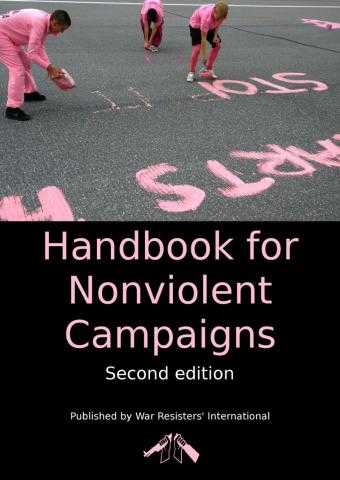Statement by Women in Black Madrid
Once again the guardians of democracy rise up as saviors, in this case, saviors of Syria. But when they speak of helping the Syrians, they speak of military support to the insurgents in order to defend their own interests in the area. While peaceful protests lasted, the international community looked aside. When Asad crushed them harshly: the uprising of the children of Deraa, the sit-ins and demonstrations of the young people and the country folks, there was no great echo in the conventional media.
Press statement , 14 October 2013
Belgian former prime ministers and a former Secretary General of the NATO support campaign against nuclear weapons.
'Time to Go!' is the name of the campaign of the Belgian peace movement against the American nuclear weapons stationed in Belgium. On Sunday 20 October 2013 (from 2 until 6 p.m.) the peace movement organizes a national demonstration for nuclear disarmament in the Belgian capital Brussels (Jubelpark- Cinquantenaire ). There will be speeches, entertainment for children and concerts of Jaune Toujours, James Deano en Helmut Lotti.
By Igor Seke
The 'War against Drugs' erupted in Mexico at the end of 2006 when Felipe Calderón, just 10 days into his presidency, launched the joint operation 'Michoacán' to fight organised crime. It has resulted in at least 60,000 deaths from executions, confrontations between gangs of narcotrafficers and battles with federal forces.
By Angie Zelter
In 2016 the UK government will finalise the decision to build a new nuclear weapons system to replace the present Trident system (http://actionawe.org/the-trident-system/). The nuclear submarines that carry Trident are getting old, so the government has pledged to finalise contracts to replace them in 2016 in order to build a new generation of nuclear weapons at an estimated cost of £76–100 billion. This is more than the current planned public spending cuts of £81 billion. If the contracts go ahead, the warheads would be designed and manufactured at AWE (Atomic Weapons Establishment) Aldermaston and Burghfield, in Berkshire, about 50 miles west of London ( http://actionawe.org/awe-burghfield-maps-gates/ ).
By Lindsey Collen
The Island states of Africa often get forgotten. The word “the continent” somehow leaves them out. And this is a serious conceptual error when it comes to scrutinizing the US military presence in Africa.
Let’s take things step-by-step.
By Dr. Masami Kawamura
Okinawa, the southernmost prefecture of Japan, consisting of some 160 islands with a population of approximately 1.4 million, is known as kichi no shima or military base islands. While Okinawa consists of only 0.6% of all the Japanese landmass, 74% of US military bases in Japan are concentrated in the prefecture. At present, further militarisation of Okinawa is taking place and Okinawan people are putting up a stern opposition to it. With a brief background of the militarisation of Okinawa, I would like to highlight two recent developments: the construction of a US military airport in the Henoko/Oura Bay area and the construction of six helipads at Takae in Yanbaru Forest.
The Worst of Times, the Best of Times…
by Matt Meyer
There is a reason why so many internationalists have had hard times writing clearly about Egypt since the end of June 2013. There is a reason why in English the words “it was the best of times, it was the worst of times” resonates so. The cultural chasms and the political complexity of Egypt’s ongoing revolutionary moments will not lend themselves easily to short statements or translated sound bites . . . but we remain distant from, declarative regarding, or dispassionate about these events at our own grave peril. Nothing less than our collective, twenty-first century understandings of such terms as “democracy,” “revolution,” and “violence/nonviolence” are being forged on the streets of Egypt today.
[video:http://www.youtube.com/watch?v=GuBzlUZrArg&feature=player_embedded width:400 height:300]
By John LaForge
BÜCHEL AIR FORCE BASE, Germany -- Over 750 people converged here at the country's largest air base – although U.S. bases at Spangdahlem and Ramstein are far bigger -- to condemn the retention of 20 U.S. nuclear weapons, in open violation of the Nuclear Non-Proliferation Treaty, and in a show of popular rebellion 150 hearty war resisters blockaded all nine base entrances for 24 hours. It was the first time in 16 years of resistance to the base's use of U.S. H-bombs by Germany's Tornado jet bombers that the compound had been completely closed to traffic by a protest.
[video:http://www.youtube.com/watch?v=YEEOE7w7Eec width:400 height:300]
About 180 US nuclear bombs are still being stored in Europe for use by NATO in the event of a nuclear strike, although it is not clear who against. 20 of these nuclear bombs - left over from the Cold War - are deployed in Büchel in South Eifel (Rheinland-Pfalz), Germany.
Coming up next month is the Disarmament Camp in Burghfield, Britain from 26 August - 7 September. The camp, run by Trident Ploughshare, is part of the Action AWE campaign that is acting to halt nuclear weapons production at the Atomic Weapons Establishment factories at Aldermaston and Burghfield. Groups are coming from Finland, Sweden, Spain, France, Italy and Belgium – it would be great if more people would be able to join us!








